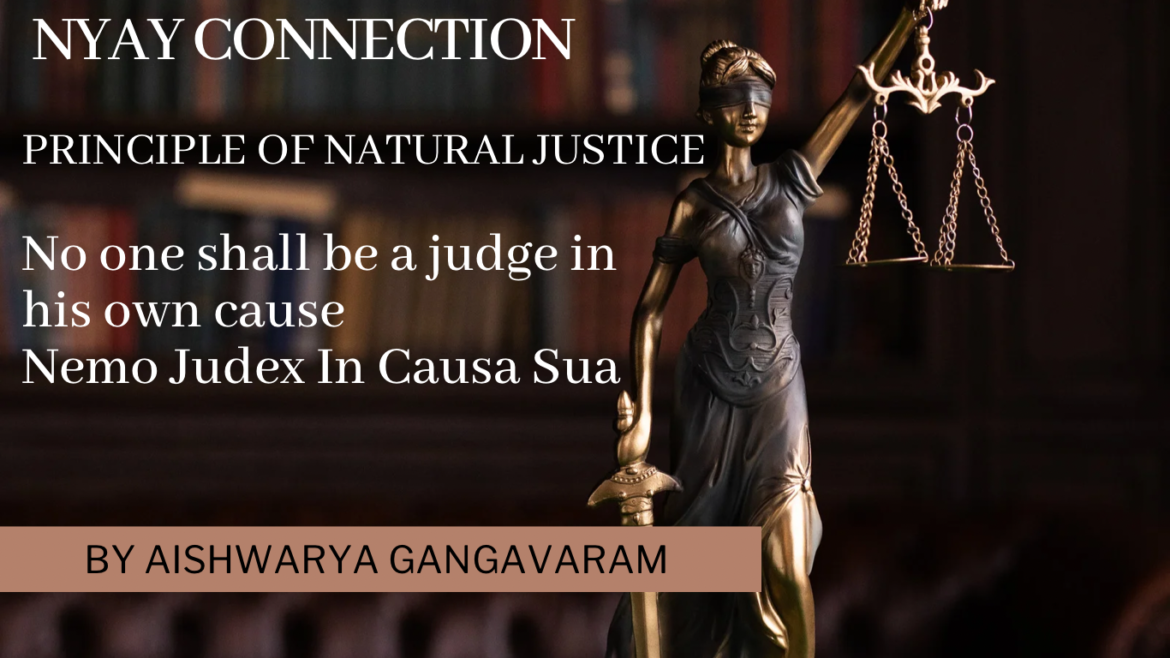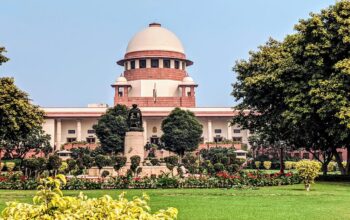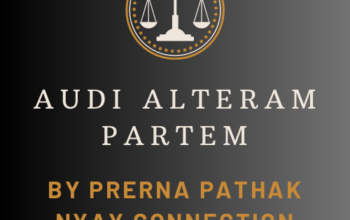INTRODUCTION
“Nemo judex in causa Sua” is a Latin legal maxim that translates to “no one shall be a judge in his own cause.” This maxim is a fundamental principle of justice and fairness that has been recognized in legal systems around the world for centuries. The principle means that a person cannot be the decision-maker in a case in which they have a personal interest or stake. This is because having a personal interest in the outcome of a case can create bias and a conflict of interest, which can undermine the fairness and impartiality of the decision-making process. The maxim is not only relevant in legal proceedings, but also in other contexts, such as administrative decision-making, corporate governance, and personal relationships. It is a cornerstone of the rule of law, which is the principle that all people, regardless of their position or status, are subject to the same laws and rules. Upholding the principle of “nemo judex in causa sua” is essential to ensuring that decisions are made impartially and objectively, without any bias or conflict of interest. It is a vital principle of justice and fairness that is crucial to the functioning of our legal and institutional systems.
- Explanation of the principle of “no one shall be a judge in his own cause”
The principle of “no one shall be a judge in his own cause” is a fundamental legal principle that forms the basis of the rule of law. It means that a person cannot be the judge in a case where they have a personal interest or stake in the outcome of the case. The principle is based on the idea that a fair and impartial decision can only be reached if the decision-maker is impartial and unbiased. The principle is essential for ensuring that justice is administered fairly and impartially. It prevents individuals or organizations from using their position of power to influence or manipulate the outcome of a case. For example, if a judge is personally involved in a case, they may be biased in their decision-making, and this could undermine the credibility of the justice system. The principle is widely recognized and applied in many legal systems around the world. It is also enshrined in international human rights instruments such as the Universal Declaration of Human Rights and the International Covenant on Civil and Political Rights. The principle of “no one shall be a judge in his own cause” is a cornerstone of the rule of law, which ensures that justice is administered fairly and impartially by preventing individuals from being the judge in cases where they have a personal interest or stake in the outcome.
- Importance of the principle in ensuring justice and fairness
The principle of “no one shall be a judge in his own cause” is crucial in ensuring justice and fairness because it helps to prevent any bias, real or perceived, from influencing the outcome of a case. The principle ensures that decision-makers are impartial and objective, and that they make decisions based solely on the evidence presented and the law applicable to the case. If a decision-maker were to act as a judge in his or her own cause, it would create a conflict of interest that could undermine the fairness and legitimacy of the decision-making process. The decision-maker might be inclined to rule in their own favour, even if the evidence and the law are against them. This would be unfair to the other party or parties involved, who would not have received a fair hearing or a fair outcome.
This principle also helps to ensure public confidence in the legal system. When people believe that the decision-makers are impartial and objective, they are more likely to accept the decisions that are made, even if they do not agree with them. This helps to maintain the rule of law and the stability of society. Overall, the principle of “no one shall be a judge in his own cause” is a fundamental principle of natural justice that is essential in ensuring that justice is done and that decisions are made fairly and impartially.
THE PRINCIPLE IN LEGAL PROCEEDINGS:
The principle of “no one shall be a judge in his own cause” is applied in various legal proceedings, including criminal trials, civil litigation, administrative law, and arbitration.
In criminal trials, the principle ensures that judges and other decision-makers are impartial and do not have any personal interest or bias that could affect the outcome of the case. For example, if a judge had a personal relationship with the accused, they would be disqualified from presiding over the trial.
In civil litigation, the principle applies to judges, jurors, and other decision-makers who might have a personal interest in the outcome of the case. For example, a juror who has a financial stake in a company involved in a lawsuit would be disqualified from serving on the jury.
In administrative law, the principle applies to decision-makers who have the power to make decisions that affect the rights and interests of individuals or groups. For example, a government official who has a personal interest in a particular decision would be disqualified from making that decision.
In arbitration, the principle applies to arbitrators who act as judges in resolving disputes between parties. The principle ensures that the arbitrators are impartial and unbiased in their decisions.
To ensure that the principle of “no one shall be a judge in his own cause” is upheld in legal proceedings, various procedures are in place, including:
Disclosure: Judges, jurors, and decision-makers are required to disclose any interests, relationships, or biases that might affect their impartiality. If there is a conflict of interest, they must recuse themselves from the case.
Challenges: Parties to a case can challenge the impartiality of judges, jurors, or decision-makers if they believe that they have a personal interest or bias that could affect the outcome of the case.
Appointments: Decision-makers are appointed through a transparent and impartial process to ensure that they are qualified, impartial, and free from any conflicts of interest.
Codes of Conduct: Judges and other decision-makers are required to adhere to codes of conduct that set out the standards of impartiality, integrity, and independence that they must maintain.
The procedures in place ensure that the principle of “no one shall be a judge in his own cause” is upheld in legal proceedings, thereby ensuring that justice is done and that decisions are made fairly and impartially.
- Requirement for judges to recuse themselves from cases where they have a personal interest
When a judge has a personal interest in a case, they are required to recuse themselves from the case. Recusal means that the judge voluntarily steps down from the case because of a conflict of interest, bias, or the appearance of bias.
The requirement for judges to recuse themselves from cases where they have a personal interest is based on the principle of “no one shall be a judge in his own cause,” which requires judges to be impartial and objective. A judge who has a personal interest in a case may be biased or may appear to be biased, and this could undermine the fairness and legitimacy of the decision-making process. The requirement for judges to recuse themselves is usually governed by rules of ethics or codes of conduct that set out the circumstances in which recusal is required. These rules typically require judges to disclose any interests or relationships that could affect their impartiality and to recuse themselves if there is a conflict of interest.
Examples of circumstances that may require recusal include:
- The judge has a financial interest in the case or in a party involved in the case.
- The judge has a personal relationship with one of the parties or their lawyer.
- The judge has previously represented one of the parties as a lawyer.
- The judge has expressed an opinion about the case or the parties involved in the case.
If a judge fails to recuse themselves when required, it may result in a mistrial or a decision being overturned on appeal. Therefore, it is essential that judges adhere to the requirement to recuse themselves in cases where they have a personal interest to maintain the integrity and fairness of the legal system
- Examples of cases where the principle has been applied in India
There are several notable cases in India where the principle of “no one shall be a judge in his own cause” has been applied. Here are a few examples:
- K. Veeraswami v. Union of India (1991): In this case, the Supreme Court held that a judge cannot be prosecuted without the permission of the Chief Justice of India. The court held that this principle was necessary to maintain the independence of the judiciary and to prevent the government from using criminal prosecution as a means of intimidating judges.
- State of Gujarat v. Kishanbhai (2014): In this case, the Gujarat High Court recused itself from hearing a case involving the state government’s decision to acquire land for a special economic zone. The court held that the Chief Justice of India should appoint a new bench to hear the case, as the high court judges had previously been involved in related proceedings and could not be considered impartial.
- Justice Karnan case (2017): In this case, the Supreme Court of India found a sitting judge of the Calcutta High Court, Justice C.S. Karnan, guilty of contempt of court and sentenced him to six months in jail. The court held that Justice Karnan’s repeated public criticisms of the judiciary and allegations of corruption against his colleagues amounted to an attack on the institution of the judiciary and undermined public confidence in the administration of justice.
- Subramanian Swamy v. Union of India (2016): In this case, the Supreme Court directed the Central Bureau of Investigation (CBI) to investigate allegations of corruption in the allocation of coal blocks by the government. The court also directed that the investigation be monitored by a special bench of the court, which was appointed to ensure that the investigation was carried out impartially and without interference.
These cases demonstrate the importance of this principle in ensuring that justice is done and that decisions are made fairly and impartially in India. They also illustrate the consequences that can arise when the principle is not followed, including the erosion of public trust and confidence in the judiciary.
- Importance of impartial decision-making in legal proceedings
Impartial decision-making is a fundamental principle of justice and fairness in legal proceedings. It is essential for protecting the rights of the accused, upholding the rule of law, ensuring equal treatment under the law, and preserving the legitimacy of the legal system. It ensures that decisions are made solely based on the evidence and arguments presented, and not on the personal beliefs, biases, or interests of the judge or any other decision-maker. Reasons:
- Protecting the rights of the accused: Impartial decision-making is necessary to ensure that the accused receives a fair trial and that their rights are protected. If a judge or decision-maker has a personal interest or bias in the case, they may not be able to make a fair and impartial decision.
- Upholding the rule of law: Impartial decision-making is a fundamental principle of the rule of law. If decisions are made based on personal beliefs or interests, rather than the law and the facts of the case, it undermines the integrity of the legal system and erodes public trust in the judiciary.
- Ensuring equal treatment under the law: Impartial decision-making is essential for ensuring that all individuals are treated equally under the law, regardless of their social status, wealth, or connections. If decisions are made based on personal interests or biases, it can lead to unequal treatment and undermine the principle of equality before the law.
- Preserving the legitimacy of the legal system: Impartial decision-making is essential for preserving the legitimacy of the legal system. If decisions are perceived as biased or influenced by personal interests, it can lead to a loss of confidence in the legal system and undermine its authority.
THE PRINCIPLE IN ADMINISTRATIVE DECISION MAKING:
The principle of “no one shall be a judge in his own cause” also applies to administrative decision-making, where it is important to ensure that decisions are made in the public interest and without bias or personal interest. Here are two important aspects of the principle in administrative decision-making:
- Requirement for decision-makers to disclose conflicts of interest: In administrative decision-making, decision-makers must disclose any conflicts of interest that they may have in the matter being decided. This includes any personal, financial, or other interests that may influence their decision-making. The decision-maker must then recuse themselves from the decision-making process, or take steps to mitigate the conflict of interest, such as seeking advice from an independent expert or consulting with other decision-makers.
- Importance of decision-making in the public interest: Administrative decision-making must be made in the public interest, which means that decisions must be made for the benefit of the community as a whole, rather than for the benefit of individuals or special interest groups. This requires decision-makers to consider a range of factors, including legal, economic, social, and environmental factors, and to balance competing interests in a fair and reasonable manner.
- Importance of decision-making in the public interest:
Accountability: Administrative decision-making must be accountable to the public and subject to public scrutiny. Decision-makers must be able to justify their decisions based on the relevant legal and policy considerations, and in the absence of any personal or private interests.
Transparency: Decision-making in the public interest requires transparency, as the public has a right to know how and why decisions are made. This helps to ensure that decision-making is fair and reasonable, and that it is free from bias or undue influence.
Legitimacy: Decision-making in the public interest is important for the legitimacy of administrative bodies, as it helps to ensure that decisions are made impartially and without bias or favouritism. This helps to preserve public confidence in the decision-making process and in the administrative body as a whole.
In conclusion, the principle of “no one shall be a judge in his own cause” is equally applicable to administrative decision-making as it is to legal proceedings. Decision-makers must disclose any conflicts of interest, and decision-making must be made in the public interest, which requires balancing competing interests in a fair and reasonable manner. This helps to ensure accountability, transparency, and legitimacy in administrative decision-making.
THE PRINCIPLE IN CORPORATE GOVERNANCE:
In the context of corporate governance, the principle of “no one shall be a judge in his own cause” applies to directors and requires them to act in the best interests of the company and its stakeholders. Here are two important aspects of the principle in corporate governance:
- Requirement for directors to abstain from voting on matters where they have a personal interest:
Directors have a fiduciary duty to act in the best interests of the company and its stakeholders. They must disclose any conflicts of interest they may have in a matter being considered by the board, and abstain from voting on the matter. This helps to ensure that decisions are made in the best interests of the company and its stakeholders, rather than for personal gain.
- Importance of decision-making in the best interests of the company and its stakeholders:
Corporate decision-making must be made in the best interests of the company and its stakeholders, which includes shareholders, employees, customers, and the broader community. This requires directors to consider a range of factors, including financial, social, and environmental considerations, and to balance competing interests in a fair and reasonable manner.
CHALLENGES IN APPLYING THE PRINCIPLE:
Applying the principle of “no one shall be a judge in his own cause” can be challenging in various contexts. Here are two significant challenges:
- Difficulty in determining conflicts of interest: Determining whether a conflict of interest exists can be challenging, particularly in complex situations where multiple interests are at play. This can lead to uncertainty and disputes about whether a decision-maker has a conflict of interest.
- Factors that may undermine the principle, such as political pressure or corruption: In some cases, decision-makers may face political pressure or may be susceptible to corruption or other forms of undue influence. This can undermine the principle and result in decisions being made that are not in the public interest or the best interests of the company and its stakeholders.
STRENGTHNING THE PRINCIPLE:
To strengthen the principle of “no one shall be a judge in his own cause”, it is important to have strong legal and institutional frameworks in place, as well as policies and mechanisms to support the principle. Here are some examples:
- Legal and institutional frameworks: This includes laws and regulations that require decision-makers to disclose conflicts of interest, and that provide for mechanisms to address conflicts of interest and hold decision-makers accountable for their actions.
- Policies and mechanisms: This includes codes of conduct that set out ethical standards for decision-makers, as well as training and education programs that help decision-makers identify and manage conflicts of interest. It may also include independent oversight mechanisms, such as independent auditors or ombudsmen, to ensure that decision-making is free from bias or undue influence.
CONCLUSION:
The principle of “no one shall be a judge in his own cause” is a fundamental principle that applies to legal, administrative, and corporate decision-making. Upholding this principle is crucial for ensuring justice, fairness, and accountability in decision-making, and for promoting the public interest and the best interests of the company and its stakeholders. While there are challenges in applying the principle, there are also policies and mechanisms that can help strengthen it. It is important for decision-makers to recognize the importance of this principle and take steps to ensure that their decisions are made in a fair, impartial, and transparent manner.
This article is written by Aishwarya Gangavaram. Aishwarya is a law student from Padala Rama Reddi Law College, Hyderabad. For feedback relating to this article, you may email her at gvaishwarya08@gmail.com.
If you are also a law student or professional and wish to contribute to this website, you may submit your article at nyayconnection@gmail.com.




